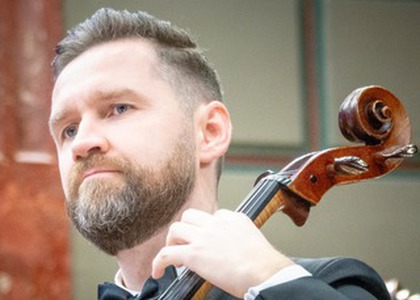> Interviews

Interview with cellist Octavian Lup
Cellist Octavian Lup and pianist Daria Tudor will perform a recital on Wednesday, November 12th, 2025, starting at 7:00 p.m., on the stage of the Great Hall of the Romanian Athenaeum. About this event, as well as about his broader artistic activity, cellist Octavian Lup spoke in an interview with Ana Sireteanu.
You are returning to the stage of the Romanian Athenaeum for a recital alongside pianist Daria Tudor. How would you describe your collaboration with her?
Daria is an extraordinary pianist, and she has proven this at the Cluj Musical Autumn Festival, where we had our first recital together. She is the kind of pianist who makes you feel like a musician in the noblest and most meaningful sense of the word. She is also a stage partner who plays an enormous role in the overall balance of a recital. Our musical dialogue and everything we have developed together have been truly remarkable, and I would like to thank Daria for accepting to perform with me! I am delighted to bring this recital to the Romanian Athenaeum, which I consider to be the most beautiful concert hall in Romania.
Part of the program you will present at the Athenaeum was also performed last week in a recital in Oradea. How was that concert received, and how did you design the program for tomorrow's performance at the Romanian Athenaeum?
The program was conceived as a broad historical arc, encompassing a wide variety of musical styles. We will perform Beethoven's Variations for Piano and Cello, followed by Schumann's Five Pieces in Folk Style, thus moving into the Romantic realm, and then we will reach Shostakovich, whose Sonata for Cello and Piano is truly splendid-a work that speaks about so many emotions, thoughts, and reasons why freedom of expression should remain an ideal we strive for every day. Finally, I chose to perform Suite No. 1 by Johann Sebastian Bach, which is an oasis of joy, full of contrasts-a place for reflection on the beauty and complexity of life. The recital in Oradea was very intense and thoroughly enjoyable! Of course, it came with its challenges-just two days before the concert, my pianist, Aurelia Vișovan, fell ill. She is an extraordinary musician, and we had to find a replacement on very short notice. Fortunately, I discovered an exceptional young pianist, Daniel Dumitrașcu, who agreed to perform with me, and the concert turned out beautifully!
Besides your concert activity, you also teach at the "Gheorghe Dima" Academy of Music in Cluj-Napoca. How do you balance these two aspects of your career, and how would you describe the experience of working with young musicians?
I have always taken great pleasure in sharing what I am and what I know with young people, and now that I teach cello at the "Gheorghe Dima" Academy of Music in Cluj, I can truly enjoy the special relationship I have with my students. We now have a new campus, as you may know, so we also benefit from excellent conditions for our work and development. I must confess that it is both a joy and an honor to be able to serve as both professor and performer, as these two roles complement each other beautifully. I learn a great deal from my students, and often I find myself applying in my concerts what I notice in them-or realizing, by observing what they lack, what I myself might need to improve. I truly feel that it is a blessing to be a teacher, and I find deep fulfillment in this profession!
Seven years ago, you also founded the "New Hope" Orchestra-an ensemble of young Romanian musicians that performs concerts throughout the country and also carries a strong social mission. Could you tell us more about this experience and the challenges of such a project?
It is by no means easy nowadays to manage a private orchestra that can include anywhere from 30 to 100 musicians, depending on the event. As you know, cultural funding in Romania is often limited, but I have always believed wholeheartedly that we, as musicians and ambassadors of art, must keep faith in our dreams and ideals. In this way, we managed to bring to life the "New Hope" Orchestra, which has now become a resonant name on the Romanian musical scene and is made up of exceptional young artists. We organize all sorts of concerts. During the pandemic, we performed in hospitals, in downtown Bucharest, and even, at one point, a "Concert for Peace" in George Enescu Square. A month ago, we had the honor of performing the Royal Concert at the Romanian Athenaeum, and just last week we played at the Babeș-Bolyai University Days in Cluj-Napoca. Our activity is intense, and I thank God that this project came to life. We are truly happy to perform for people with all our hearts and to remind them that music is essential-it connects us and makes us better human beings. Classical music, in particular, is indeed a treasure!
The "New Hope" ensemble, I believe, is fulfilling its mission-its main goal is to step beyond the concert hall and bring music to places where it might otherwise be harder to reach. This has been a very fruitful year, with many concerts, and we are already planning numerous events for the next one. In fact, on December 14th, 2025, we invite all Radio România Muzical listeners to join us for a concert-performance of "Swan Lake" in Cluj-Napoca, at the Héritage Hall of the "Gheorghe Dima" Academy of Music.
Translated by Miruna-Camelia Baicu,
University of Bucharest, Faculty of Foreign Languages and Literatures, MTTLC, year II
Corrected by Silvia Petrescu














